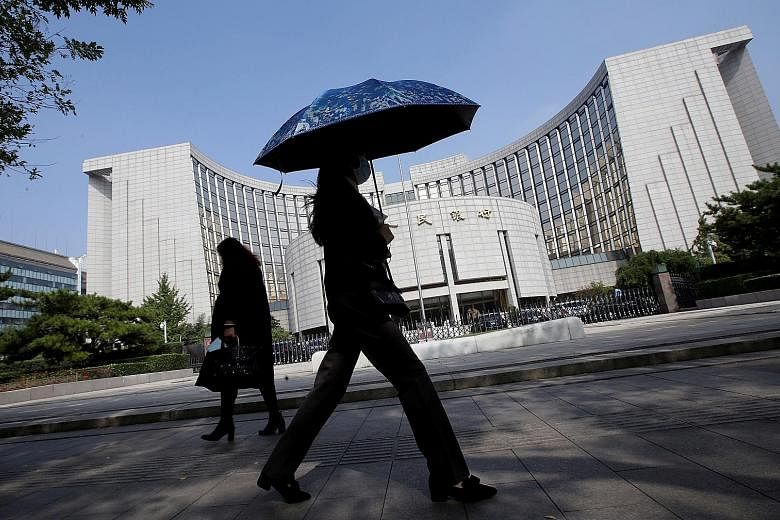BEIJING • China's central bank moved last Friday to give the country's slowing economy a jolt, saying it would essentially inject US$126 billion (S$174 billion) into the financial system as Beijing fights an escalating trade war with the United States and contends with a dangerous addiction to debt at home.
The move signalled China's willingness to ease up on a campaign to curb the borrowing that has weighed on growth in its economy, the world's second-largest, and potentially to open up its lending machine even further if the trade dispute begins to take an even greater toll.
The People's Bank of China said that it would cut its reserve requirement ratio - the amount of cash from deposits that lenders must keep in their coffers - by 0.5 percentage point on Sept 16, which would add about 900 billion yuan (S$174 billion) to the financial system.
Some banks will see their reserve ratio cut by 1 percentage point to promote lending to small businesses and private enterprises.
Senior officials also indicated last week that they planned to loosen restrictions on local governments related to raising money for infrastructure projects.
Many businesses are finding it increasingly difficult to stay open, unemployment is creeping up and families are shouldering higher daily costs. By calling on banks to lend more to companies and to encourage local governments already burdened by debt to borrow even more, the central bank hopes to stimulate growth.
Still, the step was relatively modest, given the size of the Chinese economy, the economic harm done by a year-long trade war with the United States and the lowered expectations among a growing number of economists of how much China's economy will grow next year if the trade war drags on.
"Policymaking in China's case tends to be behind the curve, which means that in an ideal world, the government should do more to support the economy," said Mr Larry Hu, chief China economist at Macquarie Group. "These policy measures are too mild and too little to stop the slowdown," he added.
Mr Hu said he planned to revise his own expectations for growth next year down from his original estimate of 6 per cent to below that figure.
UBS economist Wang Tao said she expected growth to slow to 5.5 per cent next year.
The trade tensions between China and the US escalated over the summer when Beijing allowed its tightly controlled currency to weaken to its lowest level in more than a decade against the US dollar.
Days later, central banks in several countries announced surprise interest rate cuts, setting off fears across global markets of a currency war that could stoke inflation and further weaken trade ties.
More than 30 central banks have cut interest rates so far this year amid rising concerns about economic growth and trade tensions.
The Federal Reserve in the US joined the parade last month, cutting its benchmark interest rate for the first time in a decade.
China's central bank took its action last Friday after Premier Li Keqiang called for the use of tools to shore up the country's economy.
At a State Council meeting last week led by Mr Li, officials acknowledged that the economy was facing more pressure in areas such as job growth, finance and trade.
The central bank's move is its latest to ease monetary policy.
NYTIMES

